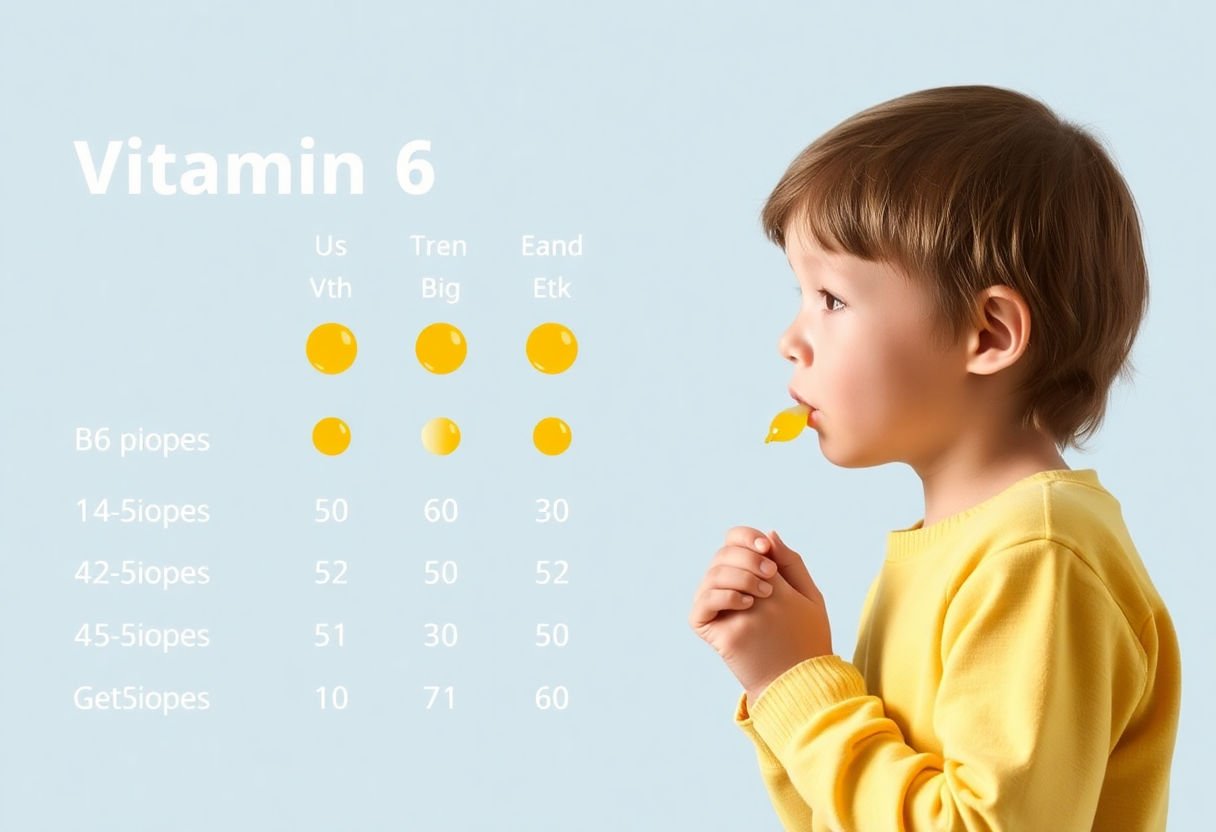Vitamin B6, an essential nutrient, plays a crucial role in children’s health and development. This article delves into the multiple benefits Vitamin B6 offers, including support for cognitive functions and a robust immune system. By understanding its sources and recommended daily intake, parents can ensure their children receive sufficient amounts. The discussion also highlights how deficiency may hinder growth and suggests ways to incorporate Vitamin B6 into balanced diets safely. Informative, comprehensive, and applicable, this guide equips you to confidently support your child’s health through mindful dietary choices.
Key Takeaways
- Vitamin B6 plays a crucial role in supporting children’s immune systems and cognitive development, contributing to their overall health and growth.
- Providing sufficient Vitamin B6 through a balanced diet can help prevent deficiencies that might impair cognitive function and hinder physical development in kids.
- Foods rich in Vitamin B6, such as poultry, fish, potatoes, and bananas, should be regularly included in children’s diets to meet their daily nutritional needs.
- Understanding the recommended daily intake of Vitamin B6 ensures that children receive adequate amounts without risking overconsumption, which may lead to side effects.
- Parents can effectively incorporate Vitamin B6 into their child’s nutrition by planning balanced meals that are both diverse and nutritious.
What is Vitamin B6?

Vitamin B6, also known scientifically as pyridoxine, is a water-soluble vitamin essential for numerous physiological functions. It plays a crucial role in metabolism, aiding in the conversion of food into energy that growing children need for daily activities. It is vital for proper brain development and function, which underscores its importance for children.
One of the primary functions of Vitamin B6 is its role in the synthesis of neurotransmitters such as serotonin and dopamine. Neurotransmitters are chemicals that transmit signals in the brain, impacting mood and behavior, which can be particularly relevant for children during growth and development phases. Thus, maintaining optimal levels of Vitamin B6 contributes to improved cognitive abilities and emotional regulation.
Additionally, Vitamin B6 is instrumental in supporting the body’s immune system. It assists in the formation of hemoglobin, the protein that carries oxygen in red blood cells, thereby boosting overall immune function and helping the body effectively fight off infections and illnesses common during childhood.
This vitamin also aids the synthesis of amino acids, which are building blocks for proteins critical to bodily repair and growth. Given its versatility in facilitating various biological processes, ensuring adequate intake of Vitamin B6 is indispensable for the healthy progress and development of children. Understanding the multifaceted roles of this vitamin highlights its significance and underlines why it is so vital for the nutritional well-being of kids.
Sources of Vitamin B6 in Diet
Vitamin B6 is essential for children’s growth and development, and ensuring they get enough of this vital nutrient can be achieved through a balanced diet rich in everyday foods.
-
Poultry and Fish: Chicken, turkey, and fish such as salmon and tuna are excellent sources of Vitamin B6. These not only provide a significant amount but also offer other valuable nutrients that support overall health.
-
Whole Grains and Cereals: Whole grain products like oatmeal, brown rice, and fortified cereals can significantly contribute to daily Vitamin B6 intake. Many cereals are specifically fortified to help meet nutritional needs, offering a convenient way to intake this vitamin.
-
Fruits and Vegetables: Bananas, potatoes, and spinach are notable mentions among fruits and vegetables high in Vitamin B6. Bananas, for example, are easy to incorporate into children’s snacks and breakfasts, making them a practical option.
-
Nuts and Seeds: Incorporating a variety of nuts and seeds, such as sunflower seeds and peanuts, can enhance the Vitamin B6 content in a child’s diet. These are simple to add to meals and snacks, providing a crunchy, nutritious boost.
-
Legumes: Beans, lentils, and chickpeas are not only high in Vitamin B6 but also rich in fiber and protein. Including legumes in meals not only adds nutrients but also diversifies the diet.
By integrating these foods into their daily meals, parents can ensure their children receive adequate Vitamin B6, supporting their health and development.
Daily Vitamin B6 Requirements for Kids

Vitamin B6 plays an essential role in children’s growth and development. Understanding the appropriate daily requirements for various age groups ensures that children receive enough of this vital nutrient for optimal health.
Recommended Intake for Different Age Groups
The daily Vitamin B6 requirement varies depending on the age of the child. For young children aged 1-3 years, the recommended intake is approximately 0.5 mg per day. As children grow, their need for Vitamin B6 increases. For those aged 4-8 years, the daily intake recommendation is 0.6 mg.
As children enter pre-adolescence, their bodies require more Vitamin B6 to support rapid growth and development. Children aged 9-13 should aim for around 1.0 mg daily. This gradual increase ensures that their bodily functions are adequately supported as they transition into their teenage years.
Importance of Meeting Daily Requirements
Meeting these recommended intakes is crucial as Vitamin B6 is pivotal in several bodily functions. It helps in producing neurotransmitters, which are necessary for brain health and cognitive function. Vitamin B6 also plays a role in maintaining a healthy immune system, promoting better overall health and well-being.
Monitoring and Adjusting Intake
Parents should pay careful attention to their child’s diet to ensure they receive the appropriate amount of Vitamin B6. While most children can meet their needs through a well-balanced diet, picky eaters or those with dietary restrictions may require additional monitoring. In such cases, consulting a healthcare professional can help tailor dietary plans to meet individual needs without risk of deficiency.
Vitamin B6 and Cognitive Development
Vitamin B6, also known as pyridoxine, plays a pivotal role in enhancing cognitive development in children. This essential vitamin is integral to the synthesis of neurotransmitters, which are chemicals that facilitate communication between nerve cells. Key neurotransmitters like serotonin, dopamine, and norepinephrine rely on Vitamin B6 for their production, significantly affecting mood, sleep, and learning capabilities.
The importance of Vitamin B6 extends further as it contributes to the formation of myelin, the protective sheath around nerves that increases the speed of signal transmission. This is crucial during the early years when rapid brain development requires efficient nerve communication to support learning and memory.
Several studies highlight the correlation between adequate Vitamin B6 levels and improved cognitive performance in children. This includes enhanced attention, memory retention, and problem-solving abilities. Ensuring an adequate intake of Vitamin B6 can therefore aid in nurturing a child’s academic performance and overall intellectual growth.
Moreover, Vitamin B6 assists in the production of hemoglobin, which carries oxygen to the brain. Adequate oxygenation is vital for proper brain function, affecting a child’s ability to focus and process information efficiently.
Parents should aim to include foods rich in Vitamin B6, such as bananas, potatoes, chickpeas, and fortified cereals, in their child’s diet. This aids in maintaining optimal brain health and supports the overall cognitive development necessary for a successful and well-rounded childhood.
Vitamin B6’s Role in Immune Function
Vitamin B6 plays a crucial role in enhancing and maintaining a robust immune system in children. This essential vitamin is involved in the production of antibodies, which help the body to defend against harmful pathogens. By facilitating the synthesis of neurotransmitters and the process of hemoglobin creation, Vitamin B6 ensures that children have a strong basis for a healthy immune response.
One significant function of Vitamin B6 is its involvement in the production of lymphocytes, a type of white blood cell that is vital for immune response. These cells are responsible for producing antibodies and regulating immune reactions, making Vitamin B6 indispensable for maintaining good health in children.
Furthermore, Vitamin B6 assists in the formation of interleukins and cytokines, small proteins crucial for immune signaling and regulation. This ensures a well-coordinated immune response against infections, thus reducing the frequency and severity of illnesses in children.
With growing bodies constantly exposed to new environments at schools and playgrounds, children need a fortified immune system to fend off diseases. Regular intake of Vitamin B6-rich foods—such as fortified cereals, poultry, and certain fish—not only supports their immune health but also contributes to their overall well-being.
It is essential for parents to monitor their children’s daily vitamin intake to prevent deficiencies that could impair immune function. A balanced diet, rich in Vitamin B6, can significantly contribute to fewer illness episodes and a healthier childhood, fostering both physical and developmental growth.
Addressing Vitamin B6 Deficiency in Kids

Vitamin B6 deficiency, though relatively uncommon, can have significant implications for children’s health. Recognizing the signs of deficiency is paramount for parents and healthcare providers alike. Symptoms in children may include irritability, fatigue, and sometimes more severe neurological issues like a tingling feeling in the feet or hands. In infants, it can even lead to seizures and developmental delays if left unaddressed.
To prevent Vitamin B6 deficiency, it is essential to incorporate sufficient amounts of this vitamin into a child’s diet. Foods rich in Vitamin B6 include:
- Poultry, such as chicken and turkey
- Fish, especially tuna and salmon
- Potatoes and other starchy vegetables
- Non-citrus fruits, like bananas
Ensuring a varied diet that includes these foods can generally help meet the daily requirements of Vitamin B6 for children. For parents who are concerned about their child’s nutritional intake, fortified cereals and grains can be excellent additional sources.
In some cases, particularly if dietary adjustments are insufficient, a healthcare provider may recommend Vitamin B6 supplements. However, it is crucial to consult a pediatrician before administering supplements to ensure they are necessary and safe, as excessive consumption can lead to adverse effects.
Regular health check-ups, coupled with a balanced diet, play a pivotal role in managing and preventing nutrient deficiencies. By being vigilant and proactive, parents can help ensure that their children maintain optimal levels of Vitamin B6, supporting their overall health and growth.
Potential Side Effects of Vitamin B6 Overconsumption

Excessive consumption of Vitamin B6, also known as pyridoxine, can lead to several potential side effects that are essential for parents to be aware of. While Vitamin B6 plays a crucial role in children’s health, too much of it can pose risks.
Inchildren, overconsumption of Vitamin B6 can result in nerve damage, which may manifest as tingling and numbness in the extremities. These neurological issues arise when the nerves become overstimulated and can lead to more severe concerns such as difficulty walking or coordinating movement. It is vital to ensure that children’s Vitamin B6 intake remains within safe limits, adhering to the recommended dietary allowance suitable for their age and development.
Children might also experience digestive problems from excessive Vitamin B6 intake. Symptoms such as nausea, bloating, and heartburn have been reported. These discomforts are usually reversible once Vitamin B6 consumption is reduced.
Moreover, overconsumption can impact sleep patterns and mood in children. An imbalance in Vitamin B6 levels might cause restlessness or insomnia, disrupting their overall well-being and affecting their daily activities.
It is crucial for parents and caregivers to monitor Vitamin B6 supplementation carefully, especially in products like multivitamins or fortified foods. Balancing Vitamin B6 intake with the overall diet, while being aware of these potential side effects, can help maintain children’s health and support their growth without unintended consequences. To mitigate these risks, consulting with a healthcare provider before introducing supplements is recommended. This proactive approach ensures that children receive the benefits of Vitamin B6 without the adverse effects associated with its overuse.
Incorporating Vitamin B6 into a Balanced Diet
To ensure that children receive an adequate intake of Vitamin B6, it’s essential to include a diverse array of foods rich in this nutrient in their daily meals. Vitamin B6, also known as pyridoxine, is found in many foods that can be seamlessly incorporated into a child’s diet.
Start by including poultry, such as chicken and turkey, which are excellent sources of Vitamin B6. They can be prepared in various forms like grilled, roasted, or in stews to make them appealing to children. Fish, particularly salmon and tuna, are also high in Vitamin B6, providing both nutrition and enjoyment if prepared as fish sticks or in sandwiches.
Incorporating whole grains like brown rice, oatmeal, and whole grain bread is another effective method. These grains can be easily incorporated into breakfast or as part of lunch and dinner. Nuts and seeds, including sunflower seeds and hazelnuts, make for great snacks and can be added to yogurt or salads.
Legumes, beans, and lentils, such as chickpeas, are versatile ingredients that can be included in soups, and salads, or made into spreads like hummus. Adding colorful vegetables, particularly dark leafy greens like spinach and broccoli, can also significantly boost Vitamin B6 levels. These can be integrated into smoothies, salads, or as side dishes.
By offering a variety of these nutritious foods, parents can ensure their children receive the necessary Vitamin B6 for optimal health and growth. Balancing these food sources in meals not only contributes to adequate nutrient intake but also fosters healthy eating habits from a young age.
Conclusion
Ensuring that children receive an adequate intake of Vitamin B6 is crucial for their overall health and development. This vital nutrient supports cognitive abilities, boosts immune function, and helps maintain a balanced diet. By understanding the sources and recommended daily intake of Vitamin B6, parents can make informed dietary choices to fulfill their children’s nutritional needs. As knowledge of nutrition advances, prioritizing a balanced diet enriched with B6 can pave the way for healthier generations. Encouraging diverse food choices rich in essential vitamins will empower families to foster their children’s growth and safeguard their health.
Frequently Asked Questions
How crucial is Vitamin B6 for a child’s growth and development?
Vitamin B6 is essential for children’s growth and development as it supports various bodily functions, including metabolism, immune system health, and brain development. It plays a critical role in the formation of neurotransmitters, impacting mood and cognitive abilities.
Can a child obtain sufficient Vitamin B6 from their diet?
Yes, children can obtain adequate Vitamin B6 through a well-balanced diet that includes foods such as poultry, fish, potatoes, chickpeas, and bananas. Ensuring a varied diet helps meet the nutritional needs without the need for supplements.
What are the signs of Vitamin B6 deficiency in children?
Symptoms of Vitamin B6 deficiency in children can include irritability, anemia, and dermatitis. In more severe cases, it can lead to confusion and weakened immune responses, which underscores the importance of maintaining adequate levels.
Is it safe to give Vitamin B6 supplements to kids?
While most children can get sufficient Vitamin B6 from their diet, supplements may be considered under professional guidance if a deficiency is diagnosed. However, it’s crucial to consult a healthcare provider to prevent the risk of overconsumption.
What happens if a child consumes too much Vitamin B6?
Excessive intake of Vitamin B6 can potentially lead to nerve damage and sensory changes over time. Parents should monitor their child’s vitamin intake to ensure it remains within recommended limits, avoiding high-dose supplements unless prescribed.


